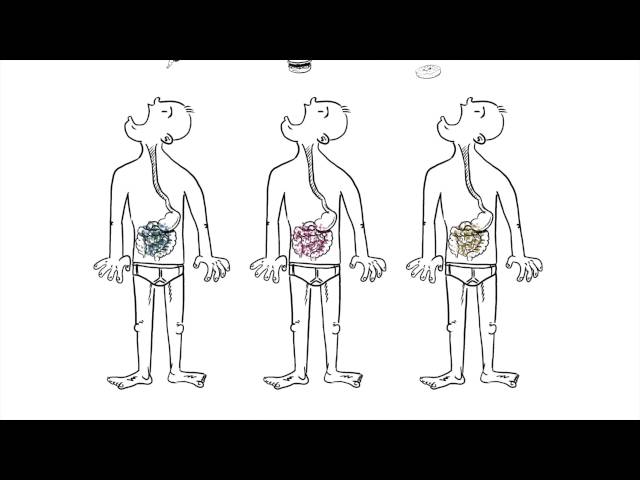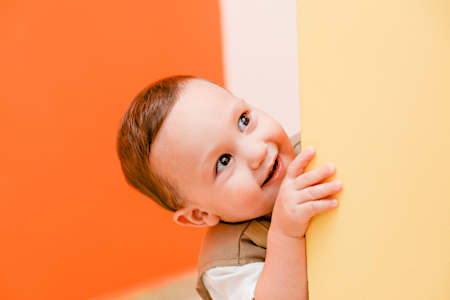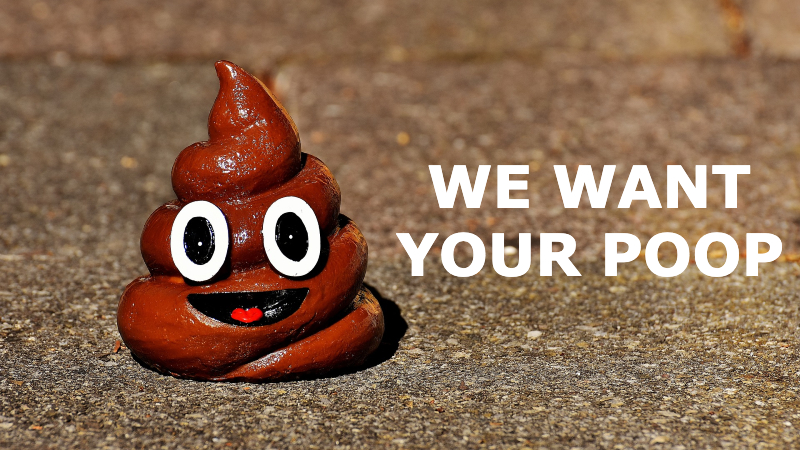SHARE
OPINIONYour poo is (mostly) alive. Here's what's in it
The Conversation
/
By Vincent Ho
Posted1 hour ago
 IMAGEMicroscopic plastic particles can appear in our faeces when we drink from plastic bottles or eat foods that have been wrapped in plastic.(Flickr: GFZ Advance)
IMAGEMicroscopic plastic particles can appear in our faeces when we drink from plastic bottles or eat foods that have been wrapped in plastic.(Flickr: GFZ Advance)
If you've ever thought your poo is just a bunch of dead cells, think again. Most of it is alive, teeming with billions of microbes.
Here's what studies in healthy adultsreveal makes up our poo.
Water
Our faeces is largely (75 per cent) made up of water, although this differs from person to person.
Vegetarians have a higher water content in their stools. Those who consume less fibre and more protein have a lower water content. Fibre has a high water-carrying ability and makes our stools more bulky, increases the frequency of bowel movements and makes the process of passing bowel motions easier.
The other 25 per cent of faeces is made up of solids, which are mainly organic (relating to living matter) materials. A small proportion of solids is made up of inorganic material such as calcium and iron phosphate as well as dried constituents of digestive juices.
Around 25-54 per cent of the organic material is made up of microbes (dead and living), such as bacteria and viruses.
Our poo is teeming with microbes, most of them alive.
Microbes
Bacteria in faeces have been extensively studied. It's estimated there are nearly 100 billion bacteria per gram of wet stool.
 IMAGENot everyone's poo is going to be the same.(ABC Local: Blythe Moore)
IMAGENot everyone's poo is going to be the same.(ABC Local: Blythe Moore)
One study that looked at a collection of fresh stools in oxygen-free conditions (as oxygen can damage certain types of bacteria) found almost 50 per cent of the bacteria were alive.
The different types of bacteria present in faeces can influence how hard or loose stool samples can be. For example,Prevotella bacteria, which can be found in the mouth, vagina and gut, are more commonly seen in those with soft stools. In fact, a high-fibre diet is strongly associated with these bacteria.
Ruminococcaceae bacteria, which are common gut microbes that break down complex carbohydrates, favour harder stools.
Viruses have been less studied than bacteria as components of the gut microbiota — the population of bacteria and viruses that live in our gut. It is estimated there are 100 million to 1 billion viruses per gram of wet faeces in most of us.
This number can change considerably when people become sick with viral gastroenteritis, such as in norovirus infections, where levels of more than a trillion viruses per gram of stool can be found.
 VIDEOWhat is the human microbiome
VIDEOWhat is the human microbiome
Certain types of viruses that infect bacteria, called bacteriophages, have been linked to diseases of the gut like Crohn's disease and ulcerative colitis.
Archaea are bacteria-like microbes that can inhabit some of the most extreme environments on Earth such as hot springs, deep sea vents or extremely acidic waters. Archaea that produce methane are known to live in the human gut and account for about 10 per cent of non-oxygen-dependent microbes.
Such methane-producing archaea likeMethanobrevibacter are associated with harder stools and constipation asmethane can slow down intestinal movement. It is believed there are about100 million archaea per gram of wet faeces.
Single-celled fungi (yeasts) are present in the gut of about 70 per cent of healthy adults. They occur in estimated concentrations of up to a million microorganisms per gram of wet faeces but comprise only a small proportion (0.03 per cent) of all microbes.
Other organic material
 IMAGEOur faeces don't contain a large proportion of carbohydrates as most are absorbed in the body.(Supplied: Paolo Saglia)
IMAGEOur faeces don't contain a large proportion of carbohydrates as most are absorbed in the body.(Supplied: Paolo Saglia)
Some of the organic material includescarbohydrates or any other undigested plant matter, protein and undigested fats. Faeces does not contain large quantities of carbohydrates as the majority of what we eat is absorbed. However, undigested amounts remain as dietary fibre.
Our faeces don't contain a large proportion of carbohydrates as most are absorbed in the body.
Some 2-25 per cent of organic matter in faeces is due to nitrogen-containing substances such as undigested dietary protein, and protein from bacteria and cells lining the colon that have been shed.
Fats contribute 2-15 per cent of the organic material in our faeces. The amount of fat excreted into our stools is highly dependent on dietary intake.
Even with no fat intake, though, we do get some excretion of fat into our faeces. Fat in faeces can come from bacteria in the form of short-chain fatty acids when they ferment foods, in addition to undigested dietary fat.
Plastic particles
A recent study has found that microscopic plastic particles can appear in our faeces when we drink from plastic bottles or eat foods that have been wrapped in plastic.
This small study of eight participants who were exposed to plastics in their food and drink identified up to nine different types of plastics in their stools.
But we need larger studies and additional analytical research to understand the clinical significance of this.
Poo is different in disease
Not everyone's poo is going to be the same. Diseases such as inflammatory bowel disease can lead to changes in the type of bacteria in our gut and result in raised inflammatory proteins that can be detected in our stool.
The presence of blood in the stool could signal bowel cancer, though this isn't always the case. Fortunately there is agood screening test that can pick up the presence of trace blood in the stools and lead to further investigations such as a colonoscopy.
Vincent Ho is a senior lecturer and clinical academic gastroenterologist, Western Sydney University. This article originally appeared on The Conversation.
Top Stories
Satellite images expose China's vast network of secret re-education camps

4 hours ago
Khashoggi strangled, dismembered immediately after entering consulate, prosecutor says

Duration: 42 seconds42s
2 hours ago
Analysis: Dutton's Dixer exposes the nagging failure in Australia's hardline border policy

4 hours ago
Asylum-seeker children likely to be off Nauru by year's end: Brandis

2 hours ago
Is my phone listening to me — and other questions you asked about our spying tech
3 hours ago
Related Stories
What happens when you hold in a fart?
This app showing people videos of them washing their own hands could help treat OCD
Duration: 3 minutes 25 seconds3m 25s
When a colonoscopy is necessary — and when it's not
ABC NEWS Newsletter
Connect with ABC News
Contact the ABC
© 2018 ABC
OPINIONYour poo is (mostly) alive. Here's what's in it
The Conversation
/
By Vincent Ho
Posted1 hour ago

If you've ever thought your poo is just a bunch of dead cells, think again. Most of it is alive, teeming with billions of microbes.
Here's what studies in healthy adultsreveal makes up our poo.
Water
Our faeces is largely (75 per cent) made up of water, although this differs from person to person.
Vegetarians have a higher water content in their stools. Those who consume less fibre and more protein have a lower water content. Fibre has a high water-carrying ability and makes our stools more bulky, increases the frequency of bowel movements and makes the process of passing bowel motions easier.
The other 25 per cent of faeces is made up of solids, which are mainly organic (relating to living matter) materials. A small proportion of solids is made up of inorganic material such as calcium and iron phosphate as well as dried constituents of digestive juices.
Around 25-54 per cent of the organic material is made up of microbes (dead and living), such as bacteria and viruses.
Our poo is teeming with microbes, most of them alive.
Microbes
Bacteria in faeces have been extensively studied. It's estimated there are nearly 100 billion bacteria per gram of wet stool.

One study that looked at a collection of fresh stools in oxygen-free conditions (as oxygen can damage certain types of bacteria) found almost 50 per cent of the bacteria were alive.
The different types of bacteria present in faeces can influence how hard or loose stool samples can be. For example,Prevotella bacteria, which can be found in the mouth, vagina and gut, are more commonly seen in those with soft stools. In fact, a high-fibre diet is strongly associated with these bacteria.
Ruminococcaceae bacteria, which are common gut microbes that break down complex carbohydrates, favour harder stools.
Viruses have been less studied than bacteria as components of the gut microbiota — the population of bacteria and viruses that live in our gut. It is estimated there are 100 million to 1 billion viruses per gram of wet faeces in most of us.
This number can change considerably when people become sick with viral gastroenteritis, such as in norovirus infections, where levels of more than a trillion viruses per gram of stool can be found.

Certain types of viruses that infect bacteria, called bacteriophages, have been linked to diseases of the gut like Crohn's disease and ulcerative colitis.
Archaea are bacteria-like microbes that can inhabit some of the most extreme environments on Earth such as hot springs, deep sea vents or extremely acidic waters. Archaea that produce methane are known to live in the human gut and account for about 10 per cent of non-oxygen-dependent microbes.
Such methane-producing archaea likeMethanobrevibacter are associated with harder stools and constipation asmethane can slow down intestinal movement. It is believed there are about100 million archaea per gram of wet faeces.
Single-celled fungi (yeasts) are present in the gut of about 70 per cent of healthy adults. They occur in estimated concentrations of up to a million microorganisms per gram of wet faeces but comprise only a small proportion (0.03 per cent) of all microbes.
Other organic material

Some of the organic material includescarbohydrates or any other undigested plant matter, protein and undigested fats. Faeces does not contain large quantities of carbohydrates as the majority of what we eat is absorbed. However, undigested amounts remain as dietary fibre.
Our faeces don't contain a large proportion of carbohydrates as most are absorbed in the body.
Some 2-25 per cent of organic matter in faeces is due to nitrogen-containing substances such as undigested dietary protein, and protein from bacteria and cells lining the colon that have been shed.
Fats contribute 2-15 per cent of the organic material in our faeces. The amount of fat excreted into our stools is highly dependent on dietary intake.
Even with no fat intake, though, we do get some excretion of fat into our faeces. Fat in faeces can come from bacteria in the form of short-chain fatty acids when they ferment foods, in addition to undigested dietary fat.
Plastic particles
A recent study has found that microscopic plastic particles can appear in our faeces when we drink from plastic bottles or eat foods that have been wrapped in plastic.
This small study of eight participants who were exposed to plastics in their food and drink identified up to nine different types of plastics in their stools.
But we need larger studies and additional analytical research to understand the clinical significance of this.
Poo is different in disease
Not everyone's poo is going to be the same. Diseases such as inflammatory bowel disease can lead to changes in the type of bacteria in our gut and result in raised inflammatory proteins that can be detected in our stool.
The presence of blood in the stool could signal bowel cancer, though this isn't always the case. Fortunately there is agood screening test that can pick up the presence of trace blood in the stools and lead to further investigations such as a colonoscopy.
Vincent Ho is a senior lecturer and clinical academic gastroenterologist, Western Sydney University. This article originally appeared on The Conversation.
Top Stories
Satellite images expose China's vast network of secret re-education camps

4 hours ago
Khashoggi strangled, dismembered immediately after entering consulate, prosecutor says

Duration: 42 seconds42s
2 hours ago
Analysis: Dutton's Dixer exposes the nagging failure in Australia's hardline border policy

4 hours ago
Asylum-seeker children likely to be off Nauru by year's end: Brandis

2 hours ago
Is my phone listening to me — and other questions you asked about our spying tech
3 hours ago
Related Stories
What happens when you hold in a fart?
This app showing people videos of them washing their own hands could help treat OCD
Duration: 3 minutes 25 seconds3m 25s
When a colonoscopy is necessary — and when it's not
ABC NEWS Newsletter
Connect with ABC News
Contact the ABC
© 2018 ABC



 How to layer for the tropics | CNA Lifestyle
How to layer for the tropics | CNA Lifestyle Breastfeeding mums: Learn why avoiding cows’ milk protein can help your child avoid cows’ milk allergyEssential Kids
Breastfeeding mums: Learn why avoiding cows’ milk protein can help your child avoid cows’ milk allergyEssential Kids










